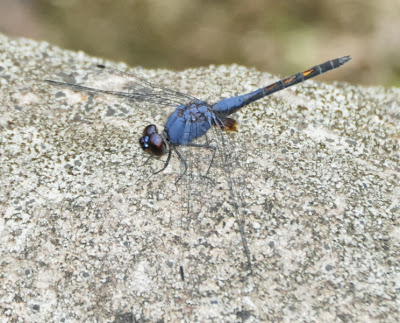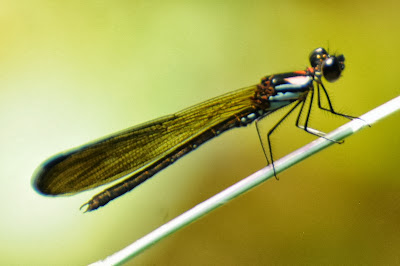For the Sunday portion of the 2012 Sarawak Nature Festival (September 30, 2012), Sue Teal took the children (including Ryan, in hat) out for some nature-viewing activities outside the Chinese Tea Room at Borneo Highlands.
While the children were busy, the birders took up their posts behind the tea room to wait for Pygmy White-Eyes (Oculocincta squamifrons), an area specialty.
I decided, instead, to explore for damselflies in the rocky stream bed just below the white-eye-watching spot. Damselflies, though, weren't the only insects to visit the damp rocks along its banks: here is a Common Eggfly (Hypolimnas bolina).
Trithemis dragonflies seemed particularly attracted to the vicinity of the streambed. This is Trithemis aurora.
Here is Trithemis festiva, demonstrating why it bears the English name "Indigo Dropwing". The wings-down-and-forward posture is typical.
These almost-golden dragonflies had me stumped, but according to Borneo odonate expert Rory Dow they are simply immature males of the common Orthetrum glaucum.
This striking insect is a male of another common species, Neurothemis ramburii.
I found three species of damselfly in the stream bed, and because the taxonomy of these insects in Sarawak is so unsettled I sent photos of the lot to Rory Dow for his comments. This one is a member of the genus Euphaia, but which species?
Rory commented: "I think that the Euphaea is E. subcostalis - subcostalis and tricolor are very similar and difficult to tell apart in photos, but the shape of the wing marking and a few other details lead me to subcostalis, plus it is the only Euphaea I found at Borneo Highlands." That's good enough for me, so a nearly-certain Euphaea subcostalis it is.
This one, a member of the short-bodied family Chlorocyphidae, is Heliocypha biseriata - though Rory notes that this species may have to be combined with another, Heliocypha biforata, a species I have seen in West Malaysia.
Finally, this beautiful little sprite - difficult to spot amid the vegetation despite its bright colours - is Prodasineura verticalis. My thanks, once again, to Rory Dow for helping me to learn a little more about these fascinating creatures!




















No comments:
Post a Comment